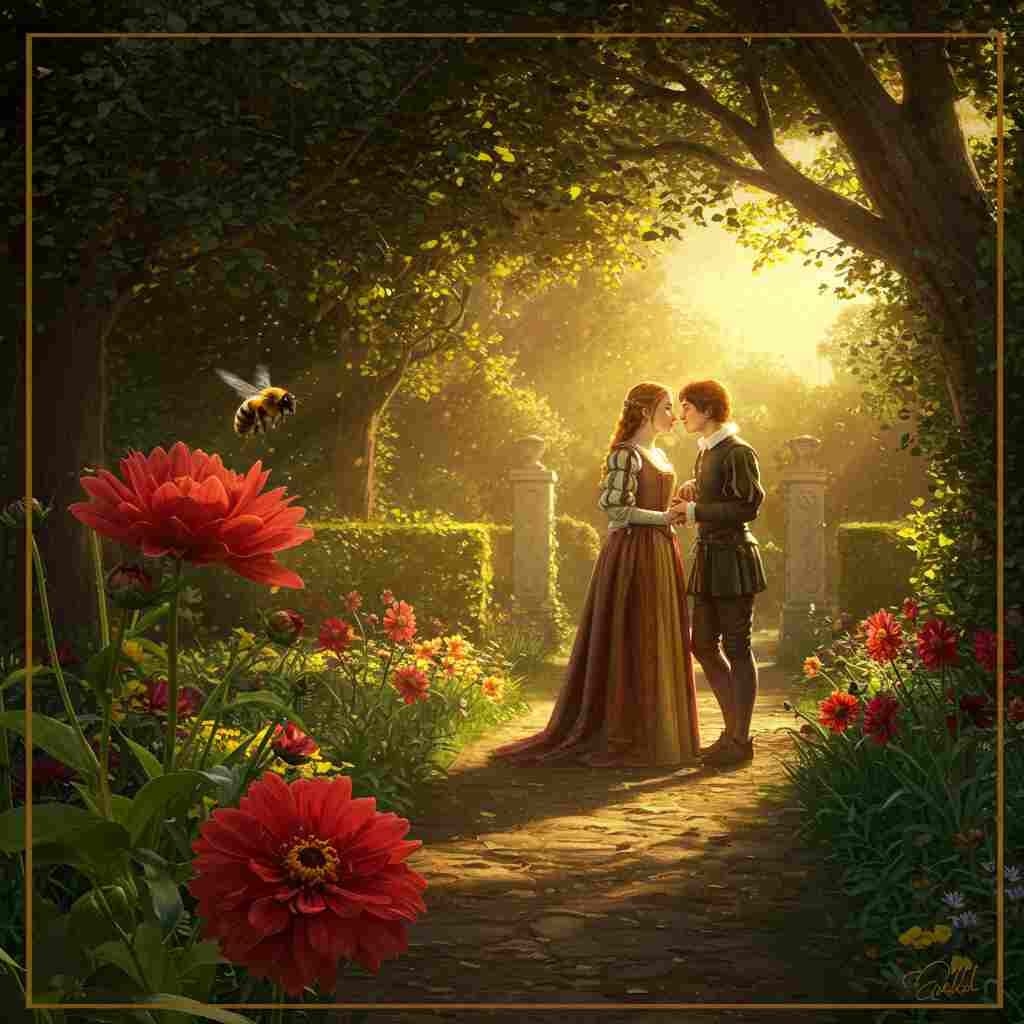Begging Another
Ben Jonson
1572 to 1637

Want to track your favorites? Reopen or create a unique username. No personal details are required!
For love's sake, kiss me once again;
I long, and should not beg in vain,
Here's none to spy or see;
Why do you doubt or stay?
I'll taste as lightly as the bee
That doth but touch his flower and flies away.
Once more, and faith I will be gone;
Can he that loves ask less than one?
Nay, you may err in this
And all your bounty wrong;
This could be called but half a kiss,
What we're but once to do, we should do long.
I will but mend the last, and tell
Where, how it should have relished well;
Join lip to lip, and try
Each suck other's breath.
And whilst our tongues perplexed lie,
Let who will, think us dead or wish our death.
Ben Jonson's Begging Another
Ben Jonson’s Begging Another is a compact yet richly layered exploration of desire, persuasion, and the tension between fleeting intimacy and enduring connection. Written during the early 17th century, the poem reflects the cultural and intellectual currents of the English Renaissance, blending classical rhetorical precision with the emotional intensity characteristic of Jonson’s lyric poetry. This analysis situates the work within its historical context, examines its literary devices and thematic concerns, and evaluates its emotional resonance through comparative and philosophical lenses.
Historical and Cultural Context
Jonson’s poem emerges from a period marked by the interplay of humanist ideals and courtly conventions. The Renaissance fascination with classical rhetoric-evident in Jonson’s structured argumentation-is tempered by the era’s preoccupation with transience, a theme echoed in contemporaneous works like John Donne’s The Flea or Robert Herrick’s To the Virgins, to Make Much of Time. The poem’s plea for a kiss operates within the tradition of carpe diem, urging the beloved to seize the moment, yet it subverts expectations by framing desire as both urgent and intellectually reasoned.
Jonson’s own biography, marked by a reputation for combative wit and a deep engagement with classical literature, informs the poem’s tone. His plays, such as Volpone and The Alchemist, often satirized societal greed and hypocrisy, but his lyric poetry reveals a more vulnerable persona. The speaker’s logical persuasion (“Can he that loves ask less than one?”) mirrors Jonson’s humanist training, which prized debate and clarity28. Yet the poem’s intimacy diverges from his public satires, suggesting a private, almost vulnerable dimension to his artistry.
Literary Devices and Themes
1. Metaphor and Sensuality
The poem’s central metaphor-the bee that “doth but touch his flower and flies away”-encapsulates the tension between fleeting pleasure and lasting connection. The bee’s gentle touch contrasts with the speaker’s desire for a deeper, more sustained kiss, symbolizing the human longing to transcend ephemeral moments. This imagery aligns with Renaissance vanitas motifs, which underscored life’s brevity, yet Jonson infuses it with erotic urgency. The progression from “taste as lightly as the bee” to “Join lip to lip, and try / Each suck other’s breath” mirrors a shift from tentative desire to consummation, blurring the lines between physical act and metaphysical union17.
2. Persuasion and Rhetoric
The speaker’s argument unfolds with forensic precision, employing rhetorical strategies reminiscent of classical oratory. Lines like “This could be called but half a kiss” use logic to dismantle the beloved’s hesitations, while the repetition of “once again” and “faith I will be gone” creates a rhythmic urgency. This structure reflects Jonson’s adherence to classical unities and his belief in poetry as a vehicle for moral and intellectual instruction410. The poem becomes a microcosm of persuasion, where love is both an emotional plea and a rational debate.
3. Public vs. Private Desire
The opening assertion-“Here’s none to spy or see”-positions the poem in a liminal space between public propriety and private longing. The speaker’s awareness of potential observers (“Let who will, think us dead”) hints at societal scrutiny, a recurring theme in Jonson’s comedies, where characters often navigate social hypocrisy. This duality reflects the Renaissance court’s preoccupation with reputation, where even intimate acts carried performative weight39.
Emotional Impact and Philosophical Underpinnings
The poem’s emotional power lies in its juxtaposition of intellectual restraint and visceral yearning. The speaker’s plea is both a logical appeal and a surrender to passion, embodying the Renaissance conflict between reason and emotion. The final lines-“Let who will, think us dead or wish our death”-elevate the kiss to a transcendent act, suggesting that true connection defies societal judgment. This aligns with Neoplatonic ideals, where physical love becomes a pathway to spiritual unity, a concept Jonson explored in his court masques5.
Comparatively, the poem diverges from Shakespeare’s sonnets, which often internalize longing (e.g., Sonnet 130’s “My mistress’ eyes are nothing like the sun”). Jonson’s speaker, by contrast, externalizes desire through dialogue, creating a dynamic interplay between lover and beloved. The poem’s unresolved tension-will the kiss be granted?-leaves readers suspended, mirroring the lovers’ own liminal state.
Conclusion
Begging Another exemplifies Jonson’s ability to compress profound emotional and intellectual complexity into a brief lyrical form. Rooted in Renaissance humanism yet animated by raw desire, the poem transcends its historical moment to speak universally about the human condition. Its blend of classical rigor and sensual immediacy underscores Jonson’s dual legacy as both a meticulous craftsman and a poet of deep emotional resonance. In pleading for a kiss, the speaker ultimately articulates a broader existential truth: that love, in all its urgency and fragility, demands both courage and vulnerability.
Through this lens, the poem becomes not merely a request for physical affection but a meditation on the ephemeral nature of human connection-a theme as resonant today as in Jonson’s time. Its enduring power lies in its ability to balance intellectual precision with emotional authenticity, securing its place in the canon of English Renaissance poetry.
This text was generated by AI and is for reference only. Learn more

